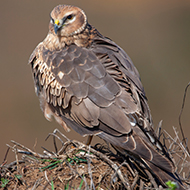
England's most endangered bird of prey continues its five-year breeding increase.
This year marks the fifth consecutive year of increases in hen harrier breeding in England, with 2021 being the most successful year on record since the 1960s.
On the red-list of birds of conservation concern within the UK, hen harriers have had their strongest year for breeding number since Defra launched its Hen Harrier Action Plan, with 84 chicks fledged from nests.
The Hen Harrier Action Plan was introduced by Defra in January 2016, and outlines six actions to conserve the species. The plan starts with the monitoring of hen harrier populations in the UK, and then proposes diversionary feeding, working alongside the Raptor Persecution Priority Delivery Group (RPPDG), nest and winter roost protection, southern reintroduction, and a trial brood management scheme.
Breeding took place across uplands in County Durham, Cumbria, Lancashire, Northumberland, and Yorkshire, and was protected and monitored by Natural England, alongside the RSPB and other partners.
Natural England's director for wildlife licensing and enforcement cases, Dave Slater, commented on the landmark number of chicks: “It is wonderful that these striking birds have seen another lift in their breeding numbers this year. It is thanks to all those involved - volunteers, landowners, and staff from all our partner organisations who have worked so hard to protect, encourage and monitor these vulnerable birds.
“However, the stark reality is that illegal persecution is still rife in their habitats, and, sadly, too many birds still go missing in unexplained circumstances.
“In recent years, tagging has increased our knowledge of their ecology and movements. Despite this year’s success, hen harriers are critically endangered in England and there is a long way to go, if we are to achieve a permanent recovery.”
Further information on how the Hen Harrier Action Plan is being implemented can be found here.



 The latest
The latest